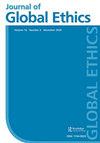Amartya Sen as a social and political theorist – on personhood, democracy, and ‘description as choice’
Q2 Arts and Humanities
引用次数: 0
Abstract
Economist-philosopher Amartya Sen's writings on social and political issues have attracted wide audiences. Section 2 introduces his contributions on: how people reason as agents within society; social determinants of people's (lack of) access to goods and of the effective freedoms and agency they enjoy or lack; and associated advocacy of self-specification of identity and high expectations for ‘voice’ and reasoning democracy. Section 3 considers his relation to social theory, his tools for theorizing action in society, and his limited degree of attention to work by sociologists and to capitalism and power structures. Section 4 characterizes a style marked by conceptual refinement, emphases on complexity and individuality, including personal individuality, and reformist optimism. Section 5 shows the features from Sections 3 and 4 at work in his conception of personhood that advocates freedom to make a reasoned composition of personal identity. Similarly, Section 6 addresses his conception of public reasoning and neglect of the sociology of democracy. It contrasts the ideal of a reasoning polity with features in many countries. Sen's programmes for critical autonomy in personhood and for reasoned politics play, nevertheless, a normic role, while his analytical formats help investigation of obstacles to more widespread agency, voice, and democratic participation.Amartya Sen作为社会和政治理论家——论人格、民主和“作为选择的描述”
经济学家兼哲学家阿马蒂亚·森(Amartya Sen)关于社会和政治问题的著作吸引了广泛的读者。第二节介绍了他在以下方面的贡献:人们如何在社会中作为行动者进行推理;决定人们(缺乏)获得商品的机会以及他们享有或缺乏有效自由和能动性的社会决定因素;与此相关的是对自我身份规范的倡导以及对“声音”和理性民主的高期望。第三部分考虑了他与社会理论的关系,他将社会行动理论化的工具,以及他对社会学家的工作以及资本主义和权力结构的有限关注。第四部分的特点是一种以概念精炼、强调复杂性和个性(包括个人个性)以及改良主义乐观主义为标志的风格。第5节展示了第3节和第4节的特征在他的人格概念中发挥作用,主张自由地对个人同一性进行合理的构成。同样,第6节讨论了他的公共推理概念和对民主社会学的忽视。它将理性政体的理想与许多国家的特点进行了对比。然而,森对人格的批判性自治和理性政治的规划发挥了规范的作用,而他的分析形式有助于调查更广泛的代理、声音和民主参与的障碍。
本文章由计算机程序翻译,如有差异,请以英文原文为准。
求助全文
约1分钟内获得全文
求助全文

 求助内容:
求助内容: 应助结果提醒方式:
应助结果提醒方式:


